Description
Stereo Flanging Device
Pyramids is a Stereo Flanging Device with five presets, eight flanger modes, tap tempo, tap subdivision, a multifunction Modify control, positive and negative Feedback, and a variable Mix control, which is something you don’t see on a flanger every day.
Built upon the same proprietary DSP architecture as the Avalanche Run™, Pyramids delivers convincing jet-engine roar, authentic through-zero tape-style warble, infinite barber pole sweeps, flexible I/O routing, and the ability to re-trigger the LFO cycle via footswitch opens up a fourth dimension of rhythmic possibilities that’s sure to tickle your third ear.
Controls
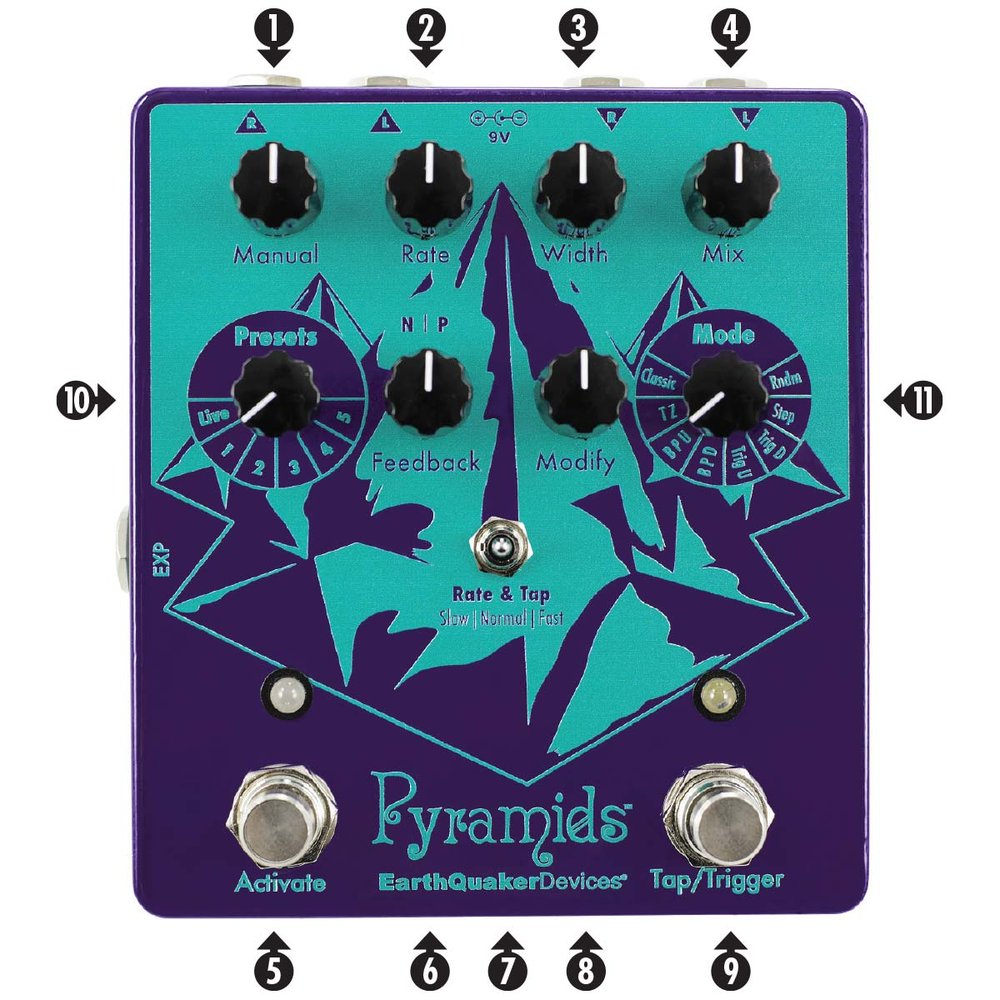
1. Manual: Controls the delay time of the modulated signal. Manual can also be controlled via expression pedal.
2. Rate: Controls the speed of the LFO as well as the rise time in “Trigger Up” mode and fall time in “Trigger Down” mode. The Rate control has three ranges of operation: Slow, Normal and Fast. These modes are selected by the Rate & Tap toggle switch.
3. Width: Controls the frequency range of the LFO sweep. You might also think of it as a depth control for the LFO.
4. Mix: This is the volume control for the modulated signal. The modulated signal gets louder when you turn it clockwise and quieter when you turn it counterclockwise.
5. Activate Footswitch: The activate switch features our Flexi-Switch™ technology! This relay-based true-bypass switch allows for momentary or latching operation.
6. Feedback: Regeneration control for the modulated signal.
7. Rate & Tap Toggle Switch: “Normal” (center position) is 1:1. The tempo you tap in is the tempo Pyramids will spit out. When set to “Slow” (left position), the tempo you tap is divided for a slower sweep. When set to “Fast” (right position), the tempo you tap is multiplied and delivers a faster sweep.
8. Modify: The behavior of this control depends upon which mode you’re using:
- Classic: Tone control for the modulated signal. Clockwise cuts the low end and allows the high frequencies to pass through. Counterclockwise cuts the high end and allows bass frequencies to pass through.
- Through-Zero: Delay time for the unmodulated dry signal. This controls where in the LFO cycle the through-zero point occurs, which is where you’ll hear the most drastic cancellation.
- Barber Pole Up: Tone control for the modulated signal. Clockwise from center is a high pass filter. Counterclockwise from center is a low pass filter.
- Barber Pole Down: Tone control for the modulated signal. Clockwise from center is a high pass filter. Counterclockwise from center is a low pass filter.
- Trigger Up: Sensitivity control for the sweep. This controls how quickly the re-triggering reacts to your pick attack.
- Trigger Down: Sensitivity control for the sweep. This controls how quickly the re-triggering reacts to your pick attack.
- Step: Adjusts the glide between steps. Low Modify settings produce sharp, stair-stepped transitions between steps. Higher Modify settings introduce a smoother glissando effect.
- Random: Adjusts the glide between steps. Low Modify settings produce sharp, stair-stepped transitions between steps. Higher Modify settings introduce a smoother glissando effect.
9. Tap / Trigger Footswitch: In Classic, Through-Zero, Barber Pole Up, Barber Pole Down, Step, and Random modes, this footswitch is a tap tempo control. In Trigger Up and Trigger Down modes, this footswitch triggers the effect whenever it is pressed.
10. Presets Rotary Switch: Selects between Live mode and one of five presets. Pyramids comes with our favorites programmed in, but you’re allowed to re-write them if you want. We don’t mind.
11. Mode Rotary Switch: Selects between Pyramids’ eight flanger modes

Presets
Pyramids ships with five example factory presets:
1- Classic
2- Barber Pole Up
3- Trigger Up
4- Step
5- Random
These are intended to get you started and are by no means the be-all-end-all examples of these modes. Please feel free to modify or overwrite these as you’d like!
Inputs & Outputs
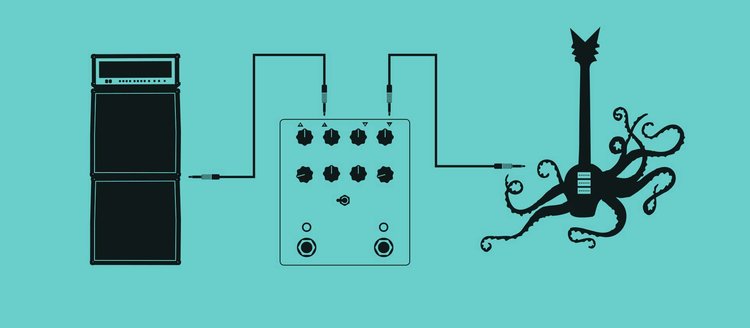
To Use Pyramids in Mono
Plug your instrument into the Left Input and use either the Left Output or the Right Output.
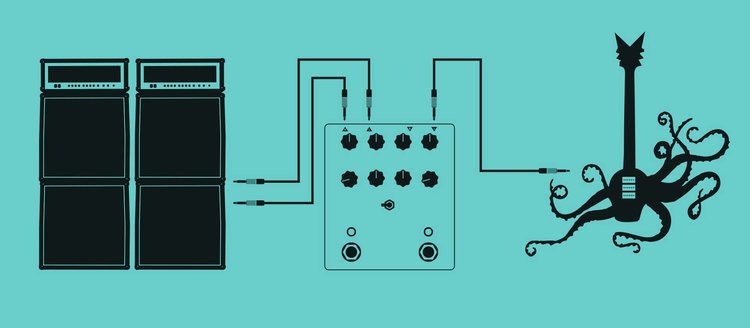
To Use Pyramids with a Mono Input and Stereo Output
Plug your instrument into the Left Input and connect both the Left Output and Right Output to the next stereo pedal in your chain, to two inputs of your DAW, or to two amplifiers.
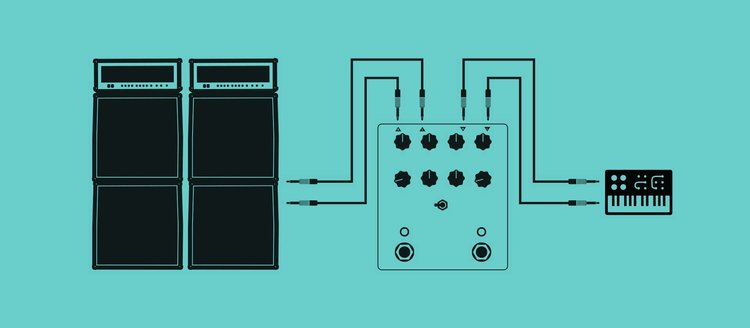
To Use Pyramids with a Stereo Input and Stereo Output
Plug your stereo instrument into the Left Input and Right Input and connect both the Left Output and Right Output to the next stereo pedal in your chain, to two inputs of your DAW, or to two amplifiers. Pyramids is true stereo and will pan across the stereo field.
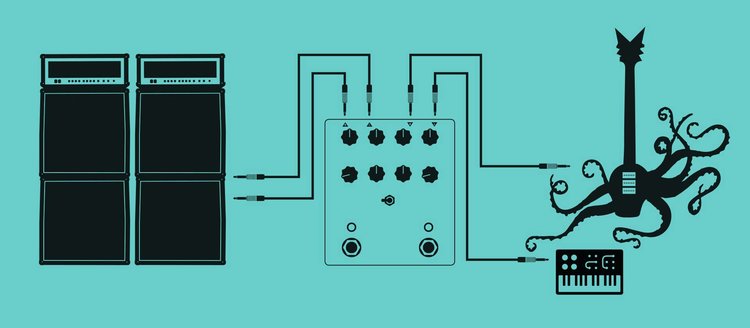
To Use Pyramids with Two Mono Sources
Plug one instrument into the Left Input and connect the Left Output to the next pedal in your chain, to a DAW input, or to an amplifier. Then, plug another instrument into the Right Input and connect the Right Output to the next pedal in a separate effects chain, to a separate DAW input, or to a separate amplifier. I have no idea why anyone would want to do this, but it’ll work.
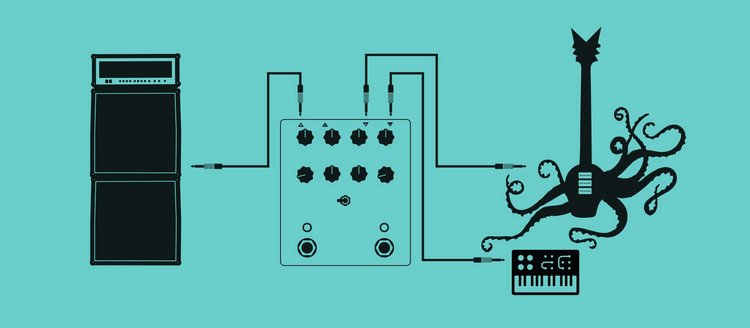
Pro Tip
In Trigger Up/Down modes, you may re-trigger the flanger using an external source in what we call Side Chain Flanging. To trigger Pyramids using an external source, plug your primary instrument (the signal on which you want to hear the flanger) into the Right Input and connect Pyramids’ Right Output to your amplifier or DAW. Connect the external trigger source (drum machine, sequencer, or CV) to Pyramids’ Left Input. To hear only the affected primary instrument signal (as modulated by the external trigger source), do not connect the Left Output. Your primary instrument’s signal will pass through Pyramids’ Right Input / Output, but the flanger will react to changes in the external trigger signal instead of your primary instrument. To monitor the trigger source, connect Pyramids’ Left Output to a separate amplifier or DAW input.
Tech Specs
Measures: 4.65″ x 4.15″ x 2.25″ with knobs
Current Draw: 460mA
Input Impedance: 1M Ohm
Output Impedance: 100 Ohm
S/N Ratio: 115dB typical
24-bit 96kHz A/D & D/A converters
All analog dry signal path
All digital wet signal path with 20Hz – 20kHz frequency response
Flexi-Switching
This device features Flexi-Switch™ Technology! This relay-based, true bypass switching style allows you to simultaneously use momentary and latching style switching.
- For standard latching operation, tap the footswitch once to activate the effect and then tap again to bypass.
- For momentary operation, hold the footswitch down for as long as you’d like to use the effect. Once you release the switch the effect will be bypassed.
Since the switching is relay based, it requires power to pass signal.
Power
- For best results, please use the included 9v center-negative 1-amp DC power supply.
- To use with multiple output transformer-balanced isolated pedal-specific power supplies,Pyramids’ may be powered from two outlets combined using a current-doubling cable. DO NOT USE A VOLTAGE-DOUBLING CABLE BECAUSE THAT WILL SEND 18V TO PYRAMIDS AND FRY IT LIKE AN OVEREASY EGG AT A GREAZY SPOON DINER.
PCBs populated by a combination of artificial and human intelligence in the Akron, Ohio of America.
Each and every Pyramids is completely assembled, wired, and tested by total human beans in the Great Sphinx of Akron, Ohio, which, coincidentally, looks exactly like the cover of Iron Maiden’s Powerslave.






















